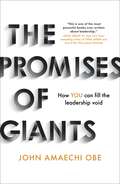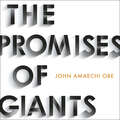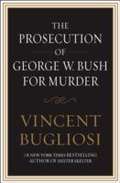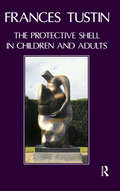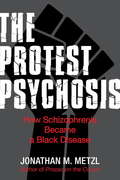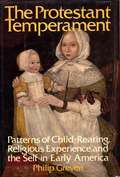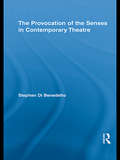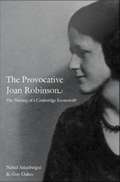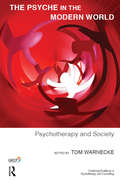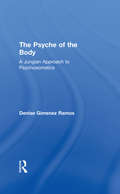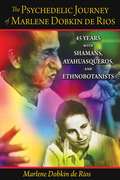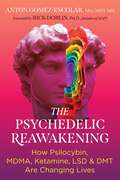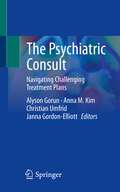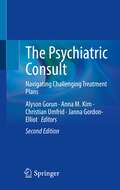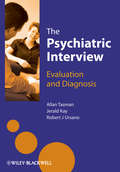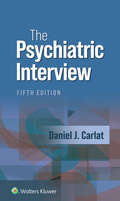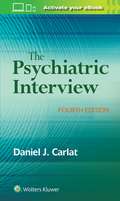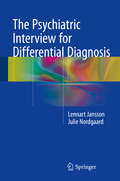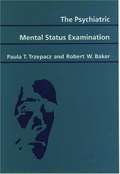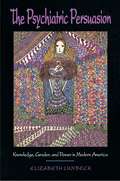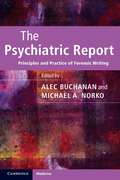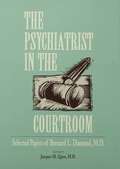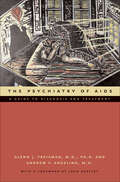- Table View
- List View
The Promises of Giants: How YOU can fill the leadership void
by John Amaechi"THIS IS ONE OF THE MOST POWERFUL BOOKS EVER WRITTEN ABOUT LEADERSHIP." Adam Grant, #1 New York Times bestselling author of THINK AGAIN and host of the TED podcast WorkLife"THE MOST UNLIKELY OF PEOPLE, IN THE MOST IMPROBABLE OF CIRCUMSTANCES, CAN BECOME EXTRAORDINARY."From socio-political chaos and workplace disruption to the climate change crisis, we have never needed people with the skill and will to collaborate to create a better world more than now. We need people who are willing to fill the leadership void. People who will embrace the influence they have. People who believe in improving society and workplace culture - not only because it makes life better, but because it is proven to yield positive results. We need more leaders.The Promises of Giants is a challenge to anyone who aspires to make a difference in their environment. Over fourteen promises, it seamlessly intertwines personal anecdotes and workplace and social observation with the latest research, to provide practical, proven tips and strategies to empower you to maximize your own potential and inspire others. It is not a self-help book. It is a how-to guide for winning, rooted in the belief that the most unlikely of people, in the most improbable of circumstances, can become extraordinary.John Amaechi well understands the responsibilities and potential that come with being a giant. The Promises of Giants is the product of a lifetime spent observing and studying effective leadership - from accompanying his mother's visits to her dying patients to competing at the highest levels of professional sport, through two decades of management consulting with multinational corporations. These experiences have shown that everyone has the ability to act decisively to influence the world in a positive way. Everyone is a giant to someone.
The Promises of Giants: How YOU can fill the leadership void --THE SUNDAY TIMES HARDBACK NON-FICTION & BUSINESS BESTSELLER--
by John Amaechi"This is one of the most powerful books ever written about leadership." Adam Grant, #1 New York Times bestselling author of THINK AGAIN and host of the TED podcast WorkLife"THE MOST UNLIKELY OF PEOPLE, IN THE MOST IMPROBABLE OF CIRCUMSTANCES, CAN BECOME EXTRAORDINARY."The Promises of Giants is an exploration of the practices and behaviours that define transformational leadership. It is a challenge, not only to those in named positions of power but to anyone who aspires to make a difference in their environment. A challenge to act decisively to influence the world in a positive way.From socio-political chaos and workplace disruption to the climate change crisis, we have never needed people with the skill and will to collaborate to create a better world more than now. We need people who are willing to fill the leadership void. People who will embrace the influence they have. People who believe in improving society and workplace culture - not only because it makes life better, but because it is proven to yield positive results. We need more leaders.The Promises of Giants is a challenge to anyone who aspires to make a difference in their environment. Over fourteen promises, it seamlessly intertwines personal anecdotes and workplace and social observation with the latest research, to provide practical, proven tips and strategies to empower you to maximize your own potential and inspire others. It is not a self-help book. It is a how-to guide for winning, rooted in the belief that the most unlikely of people, in the most improbable of circumstances, can become extraordinary.John Amaechi well understands the responsibilities and potential that come with being a giant. The Promises of Giants is the product of a lifetime spent observing and studying effective leadership - from accompanying his mother's visits to her dying patients to competing at the highest levels of professional sport, through two decades of management consulting with multinational corporations. These experiences have shown that everyone has the ability to act decisively to influence the world in a positive way. Everyone is a giant to someone.(P) 2021 Hodder & Stoughton Ltd
The Promises of Giants: How YOU can fill the leadership void --THE SUNDAY TIMES HARDBACK NON-FICTION & BUSINESS BESTSELLER--
by John Amaechi"THIS IS ONE OF THE MOST POWERFUL BOOKS EVER WRITTEN ABOUT LEADERSHIP." Adam Grant, #1 New York Times bestselling author of THINK AGAIN and host of the TED podcast WorkLife*** THE SUNDAY TIMES HARDBACK NON-FICTION & BUSINESS BESTSELLER ****** PORCHLIGHT AWARDS: BEST LEADERSHIP & STRATEGY BOOK ***The Promises of Giants is for anyone who aspires to make a difference. Over fourteen promises, it intertwines personal anecdotes with the latest research to provide practical, proven tips and strategies to empower you to maximize your own potential and inspire others. It is a how-to guide for winning, rooted in the belief that the most unlikely of people, in the most improbable of circumstances, can become extraordinary. We have never needed people with the skill and will to collaborate to create a better world more than now. We need people who are willing to fill the leadership void. People who will embrace the influence they have. People who believe in improving society and workplace culture - not only because it makes life better, but because it is proven to yield positive results. We need more leaders.SEE WHAT REVIEWERS ARE SAYING ABOUT THE PROMISES OF GIANTS:⭐⭐⭐⭐⭐ "A truly outstanding book"⭐⭐⭐⭐⭐ "An absolutely wonderful book"⭐⭐⭐⭐⭐ "I have no words that would adequately express my gratitude to John Amaechi OBE for writing such an amazing book"
The Prosecution of George W. Bush for Murder
by Vincent T. BugliosiBugliosi sets forth the legal architecture and incontrovertible evidence that President Bush took this nation to war in Iraq under false pretenses - a war that has not only caused the deaths of American soldiers but also over 100,000 innocent Iraqi men, women, and children; cost the United States over one trillion dollars thus far with no end in sight; and alienated many American allies in the Western world.
The Protective Shell in Children and Adults
by Frances TustinThis book is by a professional for other professionals, but thoughtful people who are interested in the fundamental aspects of human nature will also find much to interest them. The papers which have been published in various journals or delivered to professional audiences since the appearance of Frances Tustin's previous book Autistic Barriers in Neurotic Patients are integrated with unpublished material written especially for this book, so that they can enrich and illuminate each other. A paper from the early days of her work with autistic children is the focus of this present work, since her awareness of encapsulation as being the major protective reaction associated with the autistic states of both psychotic and neurotic patients, has stemmed from that early paper.
The Protest Psychosis: How Schizophrenia Became a Black Disease
by Jonathan MetzlA powerful account of how cultural anxieties about race shaped American notions of mental illness The civil rights era is largely remembered as a time of sit-ins, boycotts, and riots. But a very different civil rights history evolved at the Ionia State Hospital for the Criminally Insane in Ionia, Michigan. In The Protest Psychosis, psychiatrist and cultural critic Jonathan Metzl tells the shocking story of how schizophrenia became the diagnostic term overwhelmingly applied to African American protesters at Ionia--for political reasons as well as clinical ones. Expertly sifting through a vast array of cultural documents, Metzl shows how associations between schizophrenia and blackness emerged during the tumultuous decades of the 1960s and 1970s--and he provides a cautionary tale of how anxieties about race continue to impact doctor-patient interactions in our seemingly postracial America.From the Trade Paperback edition.
The Protestant Temperament: Patterns of Child-Rearing, Religious Experience, and the Self in Early America
by Philip GrevenBringing together an extraordinary richness of evidence—from letters, diaries, and other intimate family records of the seventeenth and eighteenth centuries—Philip Greven explores the strikingly distinctive ways in which Protestant children were reared in America. In tracing the hidden continuities of religious experience, of attitudes toward God, children, the self, sexuality, pleasure, virtue, and achievement, Greven identifies three distinct Protestant temperaments prevailing among Americans at the time: the Evangelical, the Moderate, and the General. The Protestant Temperamentis a powerful reassessment of the role of child-rearing and religion in early American life.
The Provocation of the Senses in Contemporary Theatre (Routledge Advances In Theatre And Performance Studies #13)
by Stephen Di BenedettoDi Benedetto considers theatrical practice through the lens of contemporary neuroscientific discoveries in this provoking study, which lays the foundation for considering the physiological basis of the power of theatre practice to affect human behavior. He presents a basic summary of the ways that the senses function in relation to cognitive science and physiology, offering an overview of dominant trends of discussion on the realm of the senses in performance. Also presented are examples of how those ideas are illustrated in recent theatrical presentations, and how the different senses form the structure of a theatrical event. Di Benedetto concludes by suggesting the possible implications these neuroscientific ideas have upon our understanding of theatrical composition, audience response, and the generation of meaning.
The Provocativo Joan Robinson: The Making of a Cambridge Economist
by Nahid Aslanbeigui Guy OakesOne of the most original and prolific economists of the twentieth century, Joan Robinson (1903-83) is widely regarded as the most important woman in the history of economic thought. Robinson studied economics at Cambridge University, where she made a career that lasted some fifty years. She was an unlikely candidate for success at Cambridge. A young woman in 1930 in a university dominated by men, she succeeded despite not having a remarkable academic record, a college fellowship, significant publications, or a powerful patron. In The Provocative Joan Robinson, Nahid Aslanbeigui and Guy Oakes trace the strategies and tactics Robinson used to create her professional identity as a Cambridge economist in the 1930s, examining how she recruited mentors and advocates, carefully defined her objectives, and deftly pursued and exploited opportunities. Aslanbeigui and Oakes demonstrate that Robinson's professional identity was thoroughly embedded in a local scientific culture in which the Cambridge economists A. C. Pigou, John Maynard Keynes, Dennis Robertson, Piero Sraffa, Richard Kahn (Robinson's closest friend on the Cambridge faculty), and her husband Austin Robinson were important figures. Although the economists Joan Robinson most admired--Pigou, Keynes, and their mentor Alfred Marshall--had discovered ideas of singular greatness, she was convinced that each had failed to grasp the essential theoretical significance of his own work. She made it her mission to recast their work both to illuminate their major contributions and to redefine a Cambridge tradition of economic thought. Based on the extensive correspondence of Robinson and her colleagues, The Provocative Joan Robinson is the story of a remarkable woman, the intellectual and social world of a legendary group of economists, and the interplay between ideas, ambitions, and disciplinary communities.
The Psyche in the Modern World: Psychotherapy and Society (The\united Kingdom Council For Psychotherapy Ser.)
by Tom WarneckeThe Psyche in the Modern World sets out to open consulting room doors and bring the concept of the Psyche, and its main advocate, the psychotherapy discipline, into public space and into the realm of interdisciplinary discourse. A culture of carefully guarded clinical confidentialities inadvertently turned the consulting room into a proverbial ivory tower which has done much to obscure the psychotherapeutic body of knowledge and contributed to the myths and misinformation that surround and veil psychotherapy in the public space. This book redresses the balance and confronts some challenging, and sometimes uncomfortable, questions about the dichotomies that both characterize our relationships with the Psyche and contextualize the provision of psychotherapy services today. The contributors present contemporary discussion on a broad range of current subjects, encompassing socio-political as well as philosophical, theoretical and clinical dimensions, in an accessible manner.
The Psyche of the Body: A Jungian Approach to Psychosomatics
by Denise Gimenez RamosThe Psyche of the Body is a passionate and well-informed plea for a Jungian version of psychosomatic medicine and psychotherapy. Illustrated by vivid clinical illustrations of case histories, The Psyche of the Body reviews the long history of psychosomatic medicine and models of the relationship between psyche and body that have evolved over time, and presents a full revision of research in the field over the last twenty years. It presents a much-needed theoretical model together with practical guidelines that demonstrate how the psychological aspects of specific illnesses should be handled in therapy and analysis. Practicing and training Jungian analysts, as well as all those involved in clinical treatment, will find the interdisciplinary approach to psychosomatic medicine promoted in this book fascinating reading.
The Psychedelic Journey of Marlene Dobkin de Rios: 45 Years with Shamans, Ayahuasqueros, and Ethnobotanists
by Marlene Dobkin de RiosA look inside almost half a century of pioneering research in the Amazon and Peru by a noted anthropologist studying hallucinogens, including ayahuasca • Reveals how ayahuasca successfully treats psychological and emotional disorders • Examines adolescent drug use from a cross-cultural perspective • Discusses the deleterious effects of drug tourism in the Amazon Ayahuasca is an alkaloid-rich psychoactive concoction indigenous to South America that has been employed by shamans for millennia as a spirit drug for divinatory and healing purposes. Although the late Harvard ethnobotanist Richard Evans Schultes was credited in the early 1950s as being the first to document the use of ayahuasca, other researchers, such as the distinguished anthropologist Marlene Dobkin de Rios, were responsible for furthering his findings and uncovering the curative capabilities of this amazing compound. The Psychedelic Journey of Marlene Dobkin de Rios presents the accumulated experience of de Rios’s 45 years of pioneering field studies in the area of hallucinogens in Peru and the Amazon. Her investigation into ayahuasca--which she undertook in collaboration with more than a dozen traditional Mestizo folk curanderos, shamans, and fellow ethnobotanists--focuses on the use of this revolutionary plant in the treatment of recalcitrant psychological and emotional disorders. She also shares some of her theories that prove that the ancient Maya used psychedelic plants as part of their religious rituals, thereby demonstrating the impact of plant psychedelics on human prehistory. In addition, Dobkin de Rios examines altered states of consciousness derived from the use of biofeedback and hypnosis and discusses her current work on the deleterious effects of drug tourism in the Amazon.
The Psychedelic Reawakening: How Psilocybin, MDMA, Ketamine, LSD, and DMT Are Changing Lives
by Anton Gomez-Escolar• Examines the contemporary psychedelic phenomenon, including the history of criminalization and legalization, psychedelics&’ effects on the brain, recent clinical research, and new therapeutic potentials• Explores substances like psilocybin, LSD, DMT, ayahuasca, ketamine, and MDMA, including scientific evidence for psychedelics&’ potential to treat addiction, depression, anxiety, trauma, and neurodegenerative diseases• Includes extensive practical information on safety, risk, and harm reduction for both laypeople and mental health practitionersPresenting a comprehensive guide to the exciting new landscape around psychedelics, psychopharmacologist Anton Gomez-Escolar examines the long history of criminalizing and (slowly) legalizing these substances and their increasingly demonstrable positive effects on body, mind, and spirit.Exploring psilocybin, LSD, DMT, ayahuasca, ketamine, MDMA, and other substances, Gomez-Escolar looks at the multitude of scientific studies providing critical evidence for psychedelics&’ ability to treat addiction, depression, anxiety, and trauma as well as their potential to treat neurodegenerative diseases such as Alzheimer&’s. He provides key information for therapists and other health practitioners as well as explores the potential benefits and limitations of microdosing and how psychedelics could help with various neurological and mental health issues, including those related to the COVID-19 pandemic. Breaking down substances by type, the author looks at the main risks of each psychedelic and its benefits, best harm-reduction strategies, and the neural pathways each affects. Gomez-Escolar also includes a large selection of resources for people seeking to engage personally with psychedelics for healing.
The Psychiatric Consult: Navigating Challenging Treatment Plans
by Janna Gordon-Elliott Alyson Gorun Anna M. Kim Christian UmfridThis book guides psychiatry trainees through some of the most common psychiatric consultation requests in the general medical hospital, using accessible, case-based narratives. Clinical case scenarios are used to demonstrate how to consider both medical and psychological factors involved in the consultation, and the approach to challenging interpersonal dynamics that may occur between the hospitalized patient and the primary medical team. Each case illustrates how to begin to think like a consultation-liaison psychiatrist in order to arrive at a diagnosis and formulate a treatment plan in complex clinical situations. Cases unfold in real time to highlight the critical role of the psychiatrist as liaison to the patient and medical team in order to guide psychiatric management and facilitate effective communication and treatment in the hospital. In addition to clinical cases, each chapter features a concise list of strategies to identify and address patient symptoms and behaviors, interpersonal dynamics, and barriers to care that arise in the hospital. The Psychiatric Consult features resident-specific recommendations and a case-based format that make it a unique, realistic, and engaging learning tool.
The Psychiatric Consult: Navigating Challenging Treatment Plans
by Alyson Gorun Anna M. Kim Christian Umfrid Janna Gordon-ElliotThis book guides psychiatry trainees through some of the most common psychiatric consultation requests in the general medical hospital, using accessible, case-based narratives. Clinical case scenarios are used to demonstrate how to consider both medical and psychological factors involved in the consultation, and the approach to challenging interpersonal dynamics that may occur between the hospitalized patient and the primary medical team. Each case illustrates how to begin to think like a consultation-liaison psychiatrist in order to arrive at a diagnosis and formulate a treatment plan in complex clinical situations. Cases unfold in real time to highlight the critical role of the psychiatrist as liaison to the patient and medical team in order to guide psychiatric management and facilitate effective communication and treatment in the hospital. In addition to clinical cases, each chapter features a concise list of strategies to identify and address patient symptoms and behaviors, interpersonal dynamics, and barriers to care that arise in the hospital. The Psychiatric Consult features resident-specific recommendations and a case-based format that make it a unique, realistic, and engaging learning tool.
The Psychiatric Interview
by Allan Tasman Robert Ursano Jerald KayWhile the ABPN has now supplied such standards for psychiatry, psychiatric interviewing instruction has not been standardized in the US or in other countries. Similarly, the few psychiatric interviewing books available are written in textbook form, often long and often from the subpecialty perspective (e.g. psychodynamic interviewing). Critically, no interviewing guides to date take a true biopsychosocial perspective. That is, they limit themselves to "interviewing" as an isolated technique divorced from full patient assessment, which for quality patient care must include the interface of psychological and social components with biological components. Similarly, few interviewing texts are fully integrated with DSM/ICD categorical diagnostic schemata, even though these descriptive diagnostic systems represent the very core of our clinical language--the lingua franca of the mental health professions. Without good descriptive diagnoses there cannot be adequate communication of clinical data among providers.The proposed book will meet this need for training in biopsychosocial assessment and diagnosis. The patient interview is at the heart of psychiatric practice. Listening and interviewing skills are the primary tools the psychiatrist uses to obtain the information needed to make an accurate diagnosis and then to plan appropriate treatment. The American Board of Psychiatry and Neurology and the Accrediting Council on Graduate Medical Education identify interviewing skills as a core competency for psychiatric residents. The Psychiatric Interview: evaluation and diagnosis is a new and modern approach to this topic that fulfills the need for training in biopsychosocial assessment and diagnosis. It makes use of both classical and new knowledge of psychiatric diagnosis, assessment, treatment planning and doctor-patient collaboration. Written by world leaders in education, the book is based on the acclaimed Psychiatry Third Edition by Tasman, Kay et al, with new chapters to address assessment in special populations and formulation. The psychiatric interview is conceptualized as integrating the patient's experience with psychological, biological, and environmental components of the illness.This is an excellent new text for psychiatry residents at all stages of their training. It is also useful for medical students interested in psychiatry and for practicing psychiatrists who may wish to refresh their interviewing skills.
The Psychiatric Interview
by Daniel J. CarlatFocusing on the practical skills needed to establish rapport with patients and gain valuable clinical insights,The Psychiatric Interview, 5th Edition, offers a practical, concise approach to improving interviewing skills. Noted psychiatrist and award-winning mental health journalist Dr. Daniel J. Carlat uses a proven combination of mnemonics, specific techniques for approaching threatening topics, and phrasing examples to illustrate the nuances of the interviewing process, making this easy-to-digest text essential reading for trainees and practitioners in psychiatry, psychology, nursing, social work, and related fields.
The Psychiatric Interview (Fourth Edition)
by Daniel J. CarlatNow DSM-5 updated! Using a unique and effective combination of mnemonics, practical techniques, and phrasing examples that illustrate the nuances of the interviewing process, The Psychiatric Interview, 4th Edition helps you establish a rapport with patients and gain valuable clinical insights. Now updated to incorporate the DSM-5 and current research, this popular manual teaches you how to improve your interviewing skills, breaking down this complex area into concise information you can put to use immediately in your practice.
The Psychiatric Interview for Differential Diagnosis
by Lennart Jansson Julie NordgaardThis book offers an alternative to operational diagnostic manuals and manuals for structured interviewing as the only sources of theoretical and clinical knowledge. It provides an exposition of psychiatric interviewing that is theoretically and clinically well founded and supplies the reader with a coherent framework for performance of a thorough psychiatric examination. The goal is not to come up with yet another interview scheme but to facilitate an understanding of the basic (but, today, completely neglected) tenets of psychopathology and phenomenology. This exposition targets the disorders of subjectivity (consciousness), the second-person processes involved in converting subjective, first-person and observable data into a third person, diagnostically useful, format. In addition, the most pertinent clinical descriptions concerning the major diagnostic groups are presented and discussed.
The Psychiatric Interview: The Art of Understanding
by Shawn SheaThe 2nd edition of this clinically based guidebook that focuses on the initial psychiatric interview provides practical suggestions for analyzing and altering the interview to mesh with the specific needs of the patient. Contains detailed discussions of how to open an interview, how to interpret nonverbal communication, how to make more natural transitions, and how to arrive at accurate diagnoses. Offers special techniques for eliciting information from depressed, psychotic, and personality-disordered patients. This edition presents updated DSM-IV criteria, new strategies in suicide assessment, and an annotated interview section accompanied by sample write-ups with tips in the appendix.
The Psychiatric Mental Status Examination
by Robert W. Baker Paula T. TrzepaczThis comprehensive text on the Mental Status Examination (MSE)should fill a void in the teaching literature and be useful to both students first learning about the MSE, and seasoned clinicians seeking an advanced reference.
The Psychiatric Persuasion: Knowledge, Gender, and Power in Modern America
by E. LunbeckIn the years between 1900 and 1930, American psychiatrists transformed their profession from a marginal science focused primarily on the care of the mentally ill into a powerful discipline concerned with analyzing the common difficulties of everyday life. How did psychiatrists effect such a dramatic change in their profession's fortunes and aims? Here, Elizabeth Lunbeck examines how psychiatry grew to take the whole world of human endeavor as its object.
The Psychiatric Report: Principles and Practice of Forensic Writing
by Alec Buchanan Michael A. NorkoThe written report is central to the practice of psychiatry in legal settings. It is required of mental health professionals acting as expert witnesses in criminal cases, civil litigation situations, child custody proceedings and risk assessments. This book provides a theoretical background to psychiatric writing for the law and a practical guide to the preparation of the report. The first section addresses practical and ethical concerns, including the conduct of the forensic psychiatric evaluation, conflicts of interest, record keeping and confidentiality. The second section contains practical and detailed advice on preparing various types of report, including reports for use in criminal and civil litigation, civil commitment hearings and child custody proceedings. A final section covers special issues arising during report preparation including the use of psychological tests and the detection of malingering. This is an essential guide for anyone required to write a psychiatric report.
The Psychiatrist in the Courtroom: Selected Papers of Bernard L. Diamond, M.D.
by Bernard L. Diamond Jacques M. QuenOver the course of an illustrious career, the late Bernard Diamond established himself as the preeminent forensic psychiatrist of the century. The Psychiatrist in the Courtroom brings together in a single volume Diamond's pivotal contributions to a variety of important issues, including the nature of diminished capacity, the fallacy of the impartial expert, the predictability of dangerousness, and the unacceptability of hypnotically facilitated memory in courtroom proceedings. Ably introduced and edited by Jacques M. Quen, M.D., a close colleague of Diamond's and leading historian of forensic psychiatry, these writings enable experts and neophytes alike to track Diamond's evolving positions while clarifying where current legal and psychiatric opinion converge -- and diverge -- on a host of critical topics.For the forensic specialist, The Psychiatrist in the Courtroom is not only an invaluable reference work but a compassionate reminder of the clinician's obligation to protect patients in legal proceedings. And in an age when clinicians are increasingly called into court, the book will be no less valuable to psychoanalysts and other mental health professionals eager for an introduction to the intricacies of judicial reasoning. Then, too, owing to Diamond's clinical acumen, the book is a compelling human document. With great erudition and deep compassion, Diamond tackles these and other knotty questions, always with an eye to clarifying the legal and clinical implications of the answers. By combining superb clinical gifts with an incisive understanding of legal principle, Diamond produced a seminal corpus whose relevance to discussions of therapeutic ethics and to legal debates will continue well into the next century.
The Psychiatry of AIDS: A Guide to Diagnosis and Treatment
by Glenn J. Treisman Andrew F. AngelinoHIV/AIDS has become a psychiatric epidemic. The disease causes or exacerbates such psychiatric disorders as depression, dementia, schizophrenia, and bipolar disease. At the same time, the presence of a psychiatric disorder can lead to increased risk for HIV infection and worsen the prognosis of patients once they are infected. Dr. Glenn J. Treisman, who has been described as the "father of AIDS psychiatry," describes the relationship between psychiatric disorders and HIV/AIDS and demonstrates the ways in which effective recognition and treatment of mental disorders can increase a patient's ability to obtain better treatment, improve compliance with medical regimens, and reduce incidents of high-risk behavior.The book provides HIV/AIDS professionals with overviews of psychiatric disorders, including mood and personality disorders, mental retardation, substance abuse and addiction, and sexual disorders and dysfunction. It also provides mental health professionals with essential information on how to care for patients with HIV and those at risk for the infection. The book discusses psychopharmacology, psychotherapy and counseling, as well as adherence and compliance issues, and the relationship between psychiatric disorders and other STDs. Containing the most up-to-date information on diagnosis, prognosis, and treatment, this book draws on the authors' unrivaled experience and uses case studies to show HIV/AIDS professionals how psychiatric interventions benefit the patient, the medical team, and society as a whole. The cases are rich and engaging, and convey to the reader the intense disorder that can affect the lives of patients.
